(Re)Covered: New coverage from old friends
John Statz, Caroline Herring, Poor Old Shine & more!
There comes a time in every New England winter where the endless snow begins to weigh heavy on the soul, threatening to crush the heart. Hope sputters as we teeter on the edge of resignation. Every weather report is like a curse. Spring becomes but a dream.
But it’s school vacation, and for a teacher, this means time: for children’s play, for catch-up chores, and then, finally, for the self. I’m writing poetry again, and the soundtrack is fine indeed, here alongside the roar of the pellet stove, new music snug and alive against the whispering silence of a world deadened by white.
Which is to say: the mailbag is stuffed to overflowing with the good stuff again, and we’re pleased as punch to finally have a chance to steep in it all. Today, then: news and new tracks from some of our favorite artists of yesteryear, with a second set to follow towards the end of the week. May their vibrant energy serve as a perfect antidote to the numb, dumb eternity of February.
 Caroline Herring was an early favorite here on the blog, an anomalous southern voice on the Massachusetts-based Signature Sounds label whose 2007 album Lantana chilled us so powerfully with its haunting portrayals of character and place, and its perfect balance of serenity and emotional investment, that we could not help but reach out for our very first interview in celebration of follow-up CD/EP set Golden Apples Of The Sun/Silver Apples of the Moon, with its fine covers of Cyndi Lauper, Kate Wolf, and Lefty Frizzell.
Caroline Herring was an early favorite here on the blog, an anomalous southern voice on the Massachusetts-based Signature Sounds label whose 2007 album Lantana chilled us so powerfully with its haunting portrayals of character and place, and its perfect balance of serenity and emotional investment, that we could not help but reach out for our very first interview in celebration of follow-up CD/EP set Golden Apples Of The Sun/Silver Apples of the Moon, with its fine covers of Cyndi Lauper, Kate Wolf, and Lefty Frizzell.
The literate singer-songwriter’s newest project I Will Go Into The Day, which dropped January 11, is nominally a children’s album, one that wholly succeeds in its attempt to “set to music the magic and wonder of childhood, and celebrate the joys of imaginative play”; as long-time proponents of kidfolk, we’re excited to steep in it on those merits alone, and eager, too, to share the album’s two covers – a sweet children’s choir version of traditional song John The Rabbit and a translated take on 1940s yiddish composition Donna Donna that transforms the tune cleanly into a powerful Appalachian lullaby. But we’re equally thrilled to find this natural antidote to the bleeps and distances of the technological life simmering with more for the mature and discerning ear, with songs that call like wistful sirens to adult nostalgia and centeredness even as Herring’s gentle guitar and warm alto warble soothe at the surface.
- Caroline Herring: Donna, Donna (orig. Sholom Secunda)
- Caroline Herring: John The Rabbit (trad.)
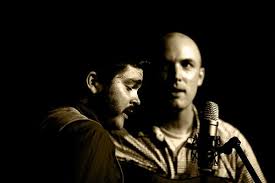 Thanks to some sweet harmonies, timeless originals from mournful to majestic, and reverent, pitch-perfect takes on Norman Blake’s Church Street Blues and Townes Van Zandt’s Loretta, Our Lady of the Tall Trees, the debut album from “new old-time” singer-songwriters and master instrumentalists Cahalen Morrison and Eli West, was one of our favorite releases of 2012; their subsequent set at Freshgrass was the highlight of our weekend, and we said so here, in a feature that seems to have been eaten by our subsequent move from one server to another. Their brand new sophomore effort I’ll Swing My Hammer With Both My Hands finds the pair comfortable with their sound: masterful licks from mandolin, banjo and guitar twine with that lonesome duo sound exquisitely on ballads and kickers alike, making the album a fine follow-up with range and resonance, an equal mix of cowboy folk and true blue bluegrass from one of the most duly and well-celebrated young duos on the scene today. Check out upbeat original Livin’ In America, lonesome heartbreaker Down In The Lonesome Draw, swinging fiddle-and-mandolin waltz version of Louvin Brothers classic Lorene, and more over at their webpage, and then snag the album via Bandcamp.
Thanks to some sweet harmonies, timeless originals from mournful to majestic, and reverent, pitch-perfect takes on Norman Blake’s Church Street Blues and Townes Van Zandt’s Loretta, Our Lady of the Tall Trees, the debut album from “new old-time” singer-songwriters and master instrumentalists Cahalen Morrison and Eli West, was one of our favorite releases of 2012; their subsequent set at Freshgrass was the highlight of our weekend, and we said so here, in a feature that seems to have been eaten by our subsequent move from one server to another. Their brand new sophomore effort I’ll Swing My Hammer With Both My Hands finds the pair comfortable with their sound: masterful licks from mandolin, banjo and guitar twine with that lonesome duo sound exquisitely on ballads and kickers alike, making the album a fine follow-up with range and resonance, an equal mix of cowboy folk and true blue bluegrass from one of the most duly and well-celebrated young duos on the scene today. Check out upbeat original Livin’ In America, lonesome heartbreaker Down In The Lonesome Draw, swinging fiddle-and-mandolin waltz version of Louvin Brothers classic Lorene, and more over at their webpage, and then snag the album via Bandcamp.
- Cahalen Morrison & Eli West: Green Pastures (trad.)
- Cahalen Morrison & Eli West: Voices of Evening (orig. Alice Gerrard)
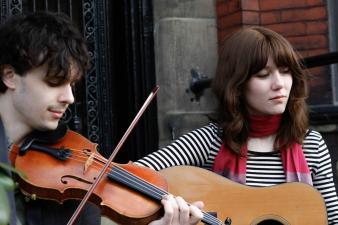 It’s rare for us to come back to an artist so soon after first discovery. But as noted in our most recent New Artists, Old Songs collection back in January, Molly Tuttle isn’t just a co-lead vocalist and guitar/banjo player for The Tuttles with AJ Lee, she’s also a budding Berklee-trained talent of her own – and her sets with both the Berklee Bluegrass crew and with her own sidestage trio at last weekend’s Joe Val Bluegrass Fest had the crowds nodding and smiling, leaving us looking for more. Happily, Tuttle proves her mettle and then some with a five-track self-titled duo EP released in early February with trio member and fellow Berklee-trained fiddler John Mailander, now available via Bandcamp, featuring lilting coverage of Joni Mitchell, traditional bluegrass tune Moonshiner, a fine original set from Molly and John, and a surprisingly sweet, robust take on country music singer-songwriter Keith Whitley’s I’m Over You that channels Kasey Chambers’ best country heartbreak.
It’s rare for us to come back to an artist so soon after first discovery. But as noted in our most recent New Artists, Old Songs collection back in January, Molly Tuttle isn’t just a co-lead vocalist and guitar/banjo player for The Tuttles with AJ Lee, she’s also a budding Berklee-trained talent of her own – and her sets with both the Berklee Bluegrass crew and with her own sidestage trio at last weekend’s Joe Val Bluegrass Fest had the crowds nodding and smiling, leaving us looking for more. Happily, Tuttle proves her mettle and then some with a five-track self-titled duo EP released in early February with trio member and fellow Berklee-trained fiddler John Mailander, now available via Bandcamp, featuring lilting coverage of Joni Mitchell, traditional bluegrass tune Moonshiner, a fine original set from Molly and John, and a surprisingly sweet, robust take on country music singer-songwriter Keith Whitley’s I’m Over You that channels Kasey Chambers’ best country heartbreak.
- Molly Tuttle and John Mailander: Morning Morgantown (orig. Joni Mitchell)
- Molly Tuttle and John Mailander: I’m Over You (orig. Keith Whitley)
 Midwestern singer-songwriter John Statz, who named his last release for the single cover among its potent narrative portraits of granite and field, was one of our favorite discoveries of 2012, and the proof, as always, is in the pursuit: since then, we’ve dug deeply into his back catalog, picking up older albums from his formative years, fallen in love with the longing and despair he brings to his live take on Leonard Cohen’s Chelsea Hotel No. 2, and found depth in his plainspoken poetry and joy in his celebration of the world as it is, leaving us eager to help spread the gospel.
Midwestern singer-songwriter John Statz, who named his last release for the single cover among its potent narrative portraits of granite and field, was one of our favorite discoveries of 2012, and the proof, as always, is in the pursuit: since then, we’ve dug deeply into his back catalog, picking up older albums from his formative years, fallen in love with the longing and despair he brings to his live take on Leonard Cohen’s Chelsea Hotel No. 2, and found depth in his plainspoken poetry and joy in his celebration of the world as it is, leaving us eager to help spread the gospel.
Statz recently holed up in a Vermont snowstorm to record a new album, with fellow Wisconsinite and Cover Lay Down fave Jeffrey Foucault on board as producer and back-up musician; after catching the pair together at Northampton venue The Parlor Room in December, and recording a couple of covers to boot, we’re eager, indeed, to hear the results. But those looking for an early fix need look no farther than 12 August, a live duo album from Statz and fellow midwestern folk troubadour and honest storyteller Josh Harty that drops today. Minimally produced, with a live session sound that celebrates the intimacy of song and place, the album features gentle performances of originals from each artist, plus covers of Greg Brown, John Prine, and more; head over to Bandcamp for streaming, digital download, and physical copies.
- John Statz w/ Jeffrey Foucault: Old Old Fashioned (orig. Frightened Rabbit)
(live from The Parlor Room, December 2013)
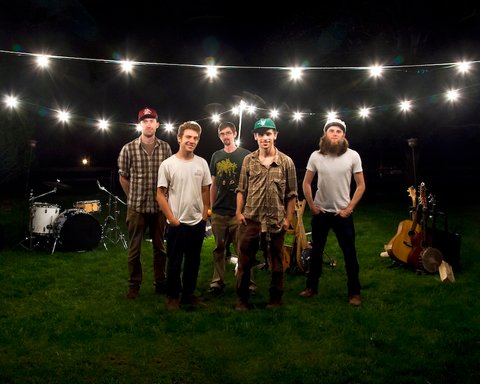 Finally, at least for today: they may have earned their place on the mainstage through top audience honors in the 2012 Emerging Artist’s Showcase, but their impromptu hour-long set in the sunwarmed vendor area at this year’s Falcon Ridge Folk Festival simply blew us away, with a cover of Ophelia, a couple of traditional barnstormers, and a small set of raw originals delivered with a combination of explosive energy and unceasing craftsmanship that both reinforced and transcended earlier comparisons to the Avett Brothers. Now, fresh off an onstage gig as the musical accompaniment for the American Repertory Theater’s winter production of Robin Hood, neotraditional Americana stringband Poor Old Shine are back home in their native Connecticut, and back on our radar with two holiday homages: a haunting Blind Willie McTell tune filmed by flashlight in a California cabin last Halloween, and a brand new Valentine’s Day delight that transforms 80’s Huey Lewis and the News soundtrack hit The Power Of Love into a loving living-room slowdance featuring their cosmic blend of old-time instrumentation and footstomping wail, trading off lines and harmonies like The Band in their very best bootleg days. Back To The Future, indeed: I’d say these guys are going places, but all I see is up.
Finally, at least for today: they may have earned their place on the mainstage through top audience honors in the 2012 Emerging Artist’s Showcase, but their impromptu hour-long set in the sunwarmed vendor area at this year’s Falcon Ridge Folk Festival simply blew us away, with a cover of Ophelia, a couple of traditional barnstormers, and a small set of raw originals delivered with a combination of explosive energy and unceasing craftsmanship that both reinforced and transcended earlier comparisons to the Avett Brothers. Now, fresh off an onstage gig as the musical accompaniment for the American Repertory Theater’s winter production of Robin Hood, neotraditional Americana stringband Poor Old Shine are back home in their native Connecticut, and back on our radar with two holiday homages: a haunting Blind Willie McTell tune filmed by flashlight in a California cabin last Halloween, and a brand new Valentine’s Day delight that transforms 80’s Huey Lewis and the News soundtrack hit The Power Of Love into a loving living-room slowdance featuring their cosmic blend of old-time instrumentation and footstomping wail, trading off lines and harmonies like The Band in their very best bootleg days. Back To The Future, indeed: I’d say these guys are going places, but all I see is up.
- Poor Old Shine: The Power Of Love (orig. Huey Lewis and the News)
- Poor Old Shine: Lay Some Flowers On My Grave (orig. Blind Willie McTell)
Looking for more Cover Lay Down in your life? “Like” our Facebook page for new coverfolk from CLD fave Al Lewis, ongoing updates from the blog and beyond, and more bonus streams and videos shared as we find ’em. And stay tuned for a second round of new 2014 releases and one-shot cover tunes from more artists previously celebrated here, including great new discoveries from Cheyenne Mize Marie, Amy Black, Juliana Richer Daily, and Charlie Parr.
2 comments » | (Re)Covered, Cahalen Morrison & Eli West, Caroline Herring, John Statz

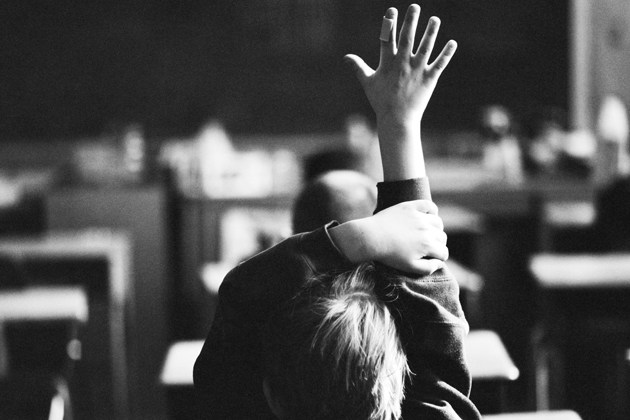
 I talk a good game in the hallways about how the new evaluation tool we use in my district: about how the tool is sound, but an inconsistent and aggressively biased application of it is a major focal point of the terror and frustration we feel as teachers. But it is also true that the threat of observation can prompt a healthy, deliberate attention to detail and self-reflection, a sort of critical, vocational soul searching which, when it works, can push us to be our best. It is a social scientist’s Heisenberg principle, in which the act of being observed changes the subject, using pressure to turn coal into diamond.
I talk a good game in the hallways about how the new evaluation tool we use in my district: about how the tool is sound, but an inconsistent and aggressively biased application of it is a major focal point of the terror and frustration we feel as teachers. But it is also true that the threat of observation can prompt a healthy, deliberate attention to detail and self-reflection, a sort of critical, vocational soul searching which, when it works, can push us to be our best. It is a social scientist’s Heisenberg principle, in which the act of being observed changes the subject, using pressure to turn coal into diamond.  As always, steeping too long in work has left me in too deep to move on quickly. My head swims still with questions, because of how deeply we considered them in our poems and analyses, because we were able to come to the higher order ones together. And I find myself pondering the world, and my place in it, after a day where everything went right, in a place where for so long I have been neither free nor safe.
As always, steeping too long in work has left me in too deep to move on quickly. My head swims still with questions, because of how deeply we considered them in our poems and analyses, because we were able to come to the higher order ones together. And I find myself pondering the world, and my place in it, after a day where everything went right, in a place where for so long I have been neither free nor safe.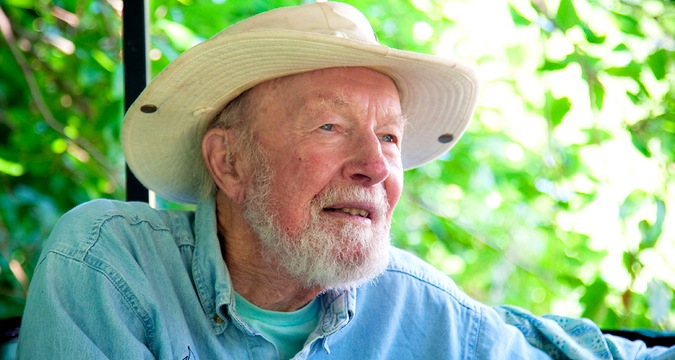
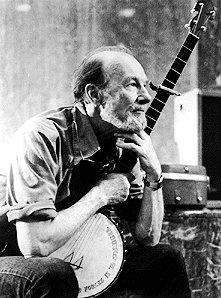 The son of an ethnomusicologist and a true believer in folk as a mechanism for tying past to future, perhaps more than any artist in history, Seeger lived folk song as if it truly did belong to the community for which it speaks. And although this practice was occasionally dismissed as a form of cultural disrespect, it is this, as much as his songs, which may well prove to be the longest lasting of his influence.
The son of an ethnomusicologist and a true believer in folk as a mechanism for tying past to future, perhaps more than any artist in history, Seeger lived folk song as if it truly did belong to the community for which it speaks. And although this practice was occasionally dismissed as a form of cultural disrespect, it is this, as much as his songs, which may well prove to be the longest lasting of his influence.